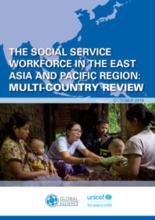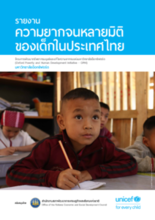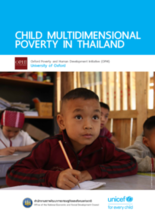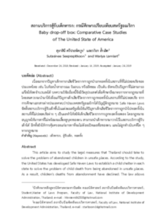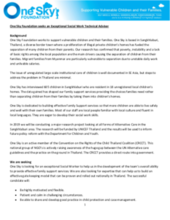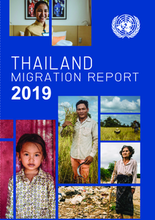This country page features an interactive, icon-based data dashboard providing a national-level overview of the status of children’s care and care reform efforts (a “Country Care Snapshot”), along with a list of resources and organizations in the country.
demographic_data
childrens_living_arrangement
children_living_without_bio
adoption
social_work_force
key_stakeholders
Key Stakeholders
Add New Datadrivers_of_institutionalisation
Drivers of Institutionaliziation
Add New Datakey_research_and_information
Key Data Sources
Add New DataThailand Alternative Care Case Study
Prevalence and number of children living in institutional care: global, regional, and country estimates
Displaying 41 - 50 of 103
The first multi-country review of the social service workforce in the East Asia and Pacific region was prepared by the Global Social Service Workforce Alliance (GSSWA) and the United Nations Children’s Fund (UNICEF) East Asia and the Pacific Regional Office (EAPRO) with the support and contribution of many people throughout the region. This report is one of several regional reports being produced by GSSWA and UNICEF to increase the availability of information on the social service workforce, and provide a baseline from which to consider ongoing workforce strengthening initiatives.
This paper examines whether children and main caregivers of overseas migrant fathers have fewer or more mental health symptoms compared to those of non-migrant fathers.
This report presents a Child Multidimensional Poverty Index (Child MPI) for Thailand.
This report presents a Child Multidimensional Poverty Index (Child MPI) for Thailand.
This article aims to study the legal measures that Thailand should take to solve the problem of abandoned children in unsafe places.
In this video, One Sky Foundation share some of their work in Thailand supporting children from disadvantaged families to stay in education.
The Child Protection Section, UNICEF East Asia and Pacific Regional Office (EAPRO) is seeking an individual consultant to provide technical support to Country Offices in the East Asia and the Pacific Region and the Regional Office on child protection in emergencies and on disability inclusion in emergency programming.
One Sky is looking for an exceptional Social Worker to help in the development of the team’s overall ability to provide effective family support services.
The Thailand Migration Report 2019, jointly produced by members of the United Nations Thailand Working Group on Migration, contains 11 chapters covering themes such as working conditions, access to services, remittances, human trafficking and exploitation. UNICEF, along with UNESCO, has co-authored Chapter 6 on Strengthening Access to Services for Migrant Children in Thailand.
The Christian Alliance for Orphans has offered this challenge grant opportunity to spark innovation as child-serving organizations create or expand effective family care solutions for children. The organizations have reported their progress in a series of videos.

